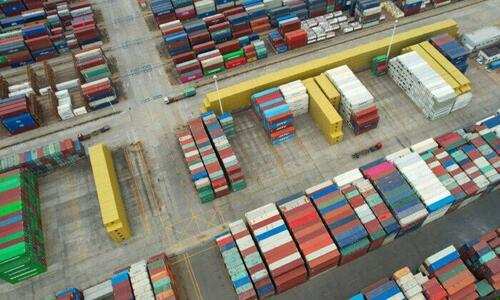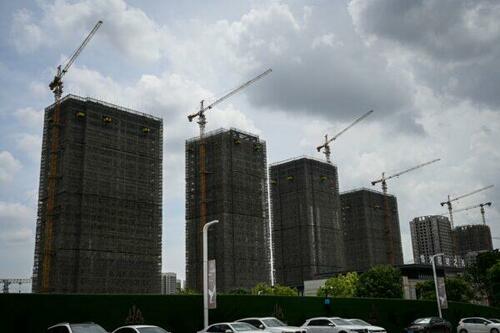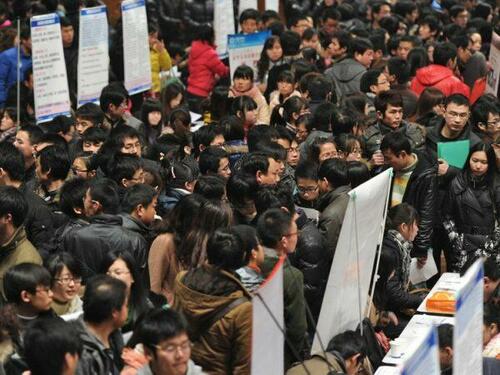
Authored by Alex Wu via The Epoch Times (emphasis ours),

Both official and independent data show that China’s economy has slumped further in the second quarter of the year, with manufacturing slowing down unexpectedly and a downturn in the real estate sector intensifying. This has raised fears of a wave of layoffs in the second half of the year adding to already severe unemployment issues in China.
China’s economy deteriorated further in July, said a China Beige Book International (CBBI) report in early August, which provides independent economic data. Factory outputs and new production orders in China reached their slowest since mid-2020, and retail employment was at its worst in more than two years, according to the latest CBBI survey. Deterioration in revenue growth for manufacturers and retailers curtailed profits, the report said.
On Aug. 1, official data revealed even worse numbers in manufacturing and real estate. Data released by the Chinese regime’s statistics bureau showed that the purchasing managers index (PMI) of China’s manufacturing industry for July was 49.0 compared with 50.2 in the previous month, a decrease of 1.2 percentage, which is below the critical level of 50.
In July, with more cases of COVID-19 emerging in parts of China, the communist regime continued its strict “zero-COVID” measures, putting many cities in lockdown, including industrial centers and economic hubs.
Manufacturing activity had rebounded in June after the lockdowns were lifted in parts of mainland China but have now slumped again.
The China Real Estate Index Research Institute publicized that in July, the average price of new residential buildings month-on-month in 100 cities in mainland China dropped instead of increasing, and the average price of homes further plummeted. Price drops for new houses were greater in cities, especially in the Yangtze River and Pearl River deltas, where housing prices had been increasing in previous years.

Property sales in the 17 cities tracked by the Index Research Institute fell 33.4 percent month-on-month in July, compared with an 88.9 percent jump in June as lockdowns lifted.
High Unemployment Rate
According to a report by major Chinese finance website Caixin, employment in the domestic manufacturing sector has continued to shrink, with the employment index falling to its lowest point in 27 months. The report attributed the layoffs to cost-cutting measures of factories, weak sales, and a “cautious attitude toward hiring” across industries.
In addition, nearly 11 million college students in mainland China graduated in the summer—a record high. According to official data released by the Chinese regime, the unemployment rate for urban youth aged 16-24 climbed to 19.3 percent in June, also record high.

Due to widespread uncertainty about employment, consumer confidence remains fragile. For those who still have jobs, many are more reluctant to spend money.
Official data shows that economic growth in mainland China slowed to 0.4 percent year-on-year in the second quarter. The outside world believes that China’s economy may even already be in recession, as the Chinese regime is known for its lack of transparency and often reports false numbers.
Dim Prospects
At China’s ruling Communist Party’s (CCP) Politburo meeting on July 28, the regime acknowledged that this year’s international environment is “complex and severe,” and that domestic tasks are “difficult and arduous.” The CCP leadership remained silent on the 5.5 percent economic growth target it set for this year. Analysts say this suggests that the CCP believes it will ultimately fail to achieve this goal.
Independent current affairs commentator Tang Jingyuan told The Epoch Times that the downturn in Chinese real estate, a pillar industry and the largest sector of local government investment and revenue, has intensified. “Manufacturing employment continues to shrink, and unemployment hits a new high, and manufacturing corresponds to the export of China’s economy. It shows that the mainland China’s consumption stimulus policy has no effect,” he said.
“These data reflect that the three pillars of China’s economy: investment, exports and consumption, are overall in deceleration or even stalling. On this basis, the CCP authorities still stick to ‘zero-COVID’ policy, which will only hurt the Chinese economy,” Tang said.
“To make matters worse, China’s economic crisis is not a question of whether it can achieve the targeted growth rate, but whether it can stabilize the economy in the next five or even 10 years.”
Xu Jian contributed to the report.
Authored by Alex Wu via The Epoch Times (emphasis ours),

Both official and independent data show that China’s economy has slumped further in the second quarter of the year, with manufacturing slowing down unexpectedly and a downturn in the real estate sector intensifying. This has raised fears of a wave of layoffs in the second half of the year adding to already severe unemployment issues in China.
China’s economy deteriorated further in July, said a China Beige Book International (CBBI) report in early August, which provides independent economic data. Factory outputs and new production orders in China reached their slowest since mid-2020, and retail employment was at its worst in more than two years, according to the latest CBBI survey. Deterioration in revenue growth for manufacturers and retailers curtailed profits, the report said.
On Aug. 1, official data revealed even worse numbers in manufacturing and real estate. Data released by the Chinese regime’s statistics bureau showed that the purchasing managers index (PMI) of China’s manufacturing industry for July was 49.0 compared with 50.2 in the previous month, a decrease of 1.2 percentage, which is below the critical level of 50.
In July, with more cases of COVID-19 emerging in parts of China, the communist regime continued its strict “zero-COVID” measures, putting many cities in lockdown, including industrial centers and economic hubs.
Manufacturing activity had rebounded in June after the lockdowns were lifted in parts of mainland China but have now slumped again.
The China Real Estate Index Research Institute publicized that in July, the average price of new residential buildings month-on-month in 100 cities in mainland China dropped instead of increasing, and the average price of homes further plummeted. Price drops for new houses were greater in cities, especially in the Yangtze River and Pearl River deltas, where housing prices had been increasing in previous years.

Property sales in the 17 cities tracked by the Index Research Institute fell 33.4 percent month-on-month in July, compared with an 88.9 percent jump in June as lockdowns lifted.
High Unemployment Rate
According to a report by major Chinese finance website Caixin, employment in the domestic manufacturing sector has continued to shrink, with the employment index falling to its lowest point in 27 months. The report attributed the layoffs to cost-cutting measures of factories, weak sales, and a “cautious attitude toward hiring” across industries.
In addition, nearly 11 million college students in mainland China graduated in the summer—a record high. According to official data released by the Chinese regime, the unemployment rate for urban youth aged 16-24 climbed to 19.3 percent in June, also record high.

Due to widespread uncertainty about employment, consumer confidence remains fragile. For those who still have jobs, many are more reluctant to spend money.
Official data shows that economic growth in mainland China slowed to 0.4 percent year-on-year in the second quarter. The outside world believes that China’s economy may even already be in recession, as the Chinese regime is known for its lack of transparency and often reports false numbers.
Dim Prospects
At China’s ruling Communist Party’s (CCP) Politburo meeting on July 28, the regime acknowledged that this year’s international environment is “complex and severe,” and that domestic tasks are “difficult and arduous.” The CCP leadership remained silent on the 5.5 percent economic growth target it set for this year. Analysts say this suggests that the CCP believes it will ultimately fail to achieve this goal.
Independent current affairs commentator Tang Jingyuan told The Epoch Times that the downturn in Chinese real estate, a pillar industry and the largest sector of local government investment and revenue, has intensified. “Manufacturing employment continues to shrink, and unemployment hits a new high, and manufacturing corresponds to the export of China’s economy. It shows that the mainland China’s consumption stimulus policy has no effect,” he said.
“These data reflect that the three pillars of China’s economy: investment, exports and consumption, are overall in deceleration or even stalling. On this basis, the CCP authorities still stick to ‘zero-COVID’ policy, which will only hurt the Chinese economy,” Tang said.
“To make matters worse, China’s economic crisis is not a question of whether it can achieve the targeted growth rate, but whether it can stabilize the economy in the next five or even 10 years.”
Xu Jian contributed to the report.







